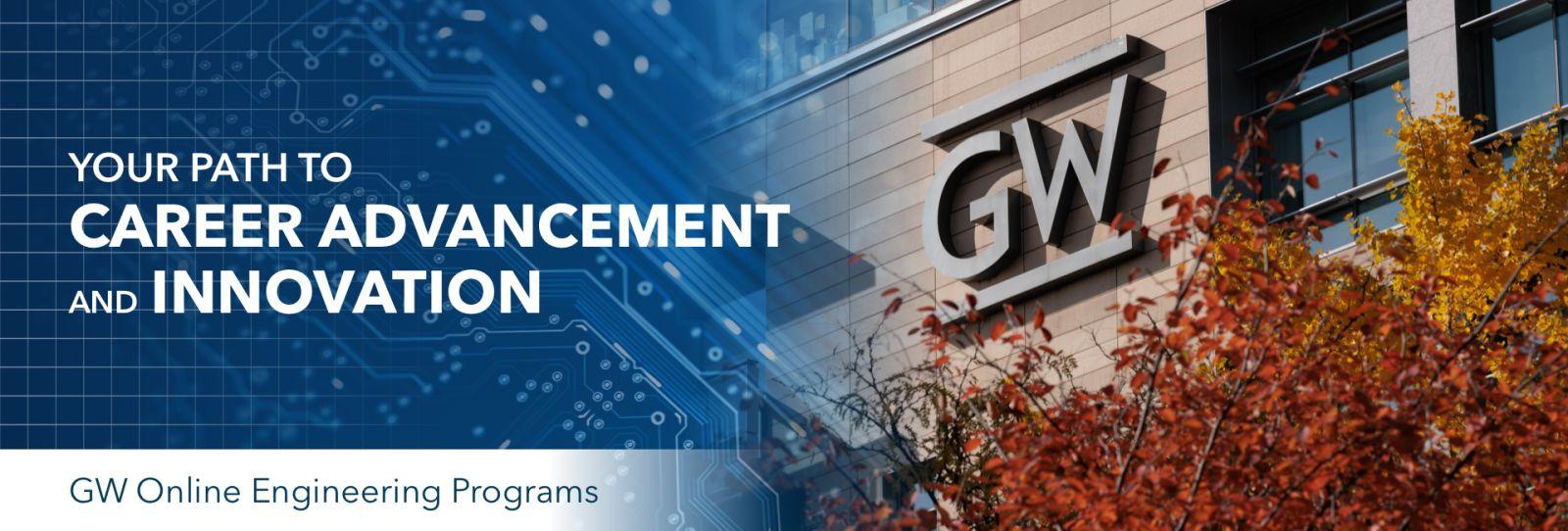George Washington University Online Graduate Engineering Programs
Enhance Your Career with GW
The George Washington University’s Online Engineering Program has been offering graduate degree programs since the early 2000s. With more than 1,200 current graduate students, our nationally-ranked online programs are some of the largest and longest-running in the United States. Our programs utilize the most innovative tools and methods to provide instruction in the latest techniques and concepts in engineering, artificial intelligence, cybersecurity, and information technology.
Find a degree that matches your career goals
Masters of Science
- Electrical Engineering
-
The online Master of Science in Electrical Engineering is designed to provide students with advanced knowledge and skills in areas such as circuit analysis, signal processing, and control systems. Students can focus on areas of power systems or telecommunications.
Learn more. - Engineering Management
-
The online Master of Science in Engineering Management is designed to provide students with the leadership skills to become effective managers in technology-driven organizations and government entities.
Learn more. - Systems Engineering
-
The online Master of Science in Systems Engineering is designed to provide students with advanced knowledge and interdisciplinary skills required for the design, integration, and management of complex systems.
Learn more.
Masters of Engineering
- Artificial Intelligence & Machine Learning
-
The online Master of Engineering in Artificial Intelligence and Machine Learning is designed to provide students with a comprehensive understanding of the algorithms and computational methods that underpin artificial intelligence and machine learning technologies.
Learn more. - Cybersecurity Analytics
-
The online Master of Engineering in Cybersecurity Analytics is designed to provide students with a comprehensive understanding of the advanced technical and managerial skills required to protect digital infrastructure and data.
Learn more. - Cybersecurity Policy & Compliance
-
The online Master of Engineering in Cybersecurity Policy and Compliance is designed to provide students with a blend of technology, law, and policy within the realm of cybersecurity. This program seeks to deepen students' understanding of the legal, ethical, and policy aspects of cybersecurity.
Learn more. - Cloud Computing Management
-
The online Master of Engineering in Cloud Computing Management is designed to provide students with a comprehensive understanding of cloud infrastructure, platforms, and software services. Students are simultaneously equipped with the managerial expertise needed to oversee complex cloud-based projects.
Learn more.
Doctoral Programs
- Artificial Intelligence & Machine Learning
-
The online Doctor of Engineering in Artificial Intelligence & Machine Learning (AI&ML) is a research-based doctorate designed to prepare professionals for advanced leadership positions in the innovation, development, and application of cutting-edge AI&ML technologies across a variety of industries. Learn more.
- Cybersecurity Analytics
-
The online Doctor of Engineering in Cybersecurity Analytics is a research-based doctorate designed to prepare professionals for advanced leadership positions in the development, implementation, and analysis of advanced cybersecurity strategies and systems.
Learn more. - Engineering Management
-
The online Doctor of Engineering in Engineering Management is a research-based doctorate designed to prepare professionals for advanced leadership positions at the highest levels of technical organizations and government agencies.
Learn more. - Systems Engineering
-
The online Doctorate of Philosophy in Systems Engineering is a fundamental research-based doctorate designed to prepare professionals for a career in research and leadership in advanced systems engineering processes.
Learn more.
Innovative and Accessible Programs
Ranked #11 by U.S. News
Fully Remote Classes
World-Class Faculty
Upcoming Doctoral Information Sessions
Doctor of Engineering
Artificial Intelligence & Machine Learning
Wed. May 15th, 6:00 pm Eastern
Doctor of Engineering
Cybersecurity Analytics
Thu. May 21st, 6:00 pm Eastern
Doctor of Philosophy &
Doctor of Engineering
Systems Engineering (Ph.D)
Engineering Management (D.Eng.)
Thu. May 23rd, 6:00 pm Eastern
Register & Join the Webinar




